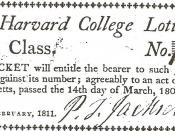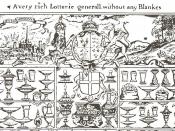When you hear the word "ÃÂLottery' an association is made with luck and reward. In Shirley Jackson's story, "The Lottery"ÃÂ, an ironic ending shifts the reader's positive association of a lottery into one of misfortune and horror. The irony of the story is that the winner of the lottery gets stoned to death by the others in the village. Throughout the story, Jackson uses irony to reinforce the theme of this work, suffering masked by the idea of fortune.
Initially, the setting creates an image of a typical small town on a normal summer day. Jackson writes, "the flowers were blooming profusely and the grass was richly green" (1). These descriptions give the reader a tranquil feeling about the town and help the reader feel comfortable about the surroundings. She puts in perspective the location of the square "between the post office and the bank" (1). This helps the reader visualize what a small size of the town.
Jackson continues to develop the feeling of comfort while describing the residents of the town. She describes children gathering together and collecting rocks. We read of men talking about "planting and rain, tractors and taxes" (3) and women, "exchanging bits of gossip" (3). A mood of simplicity and normality is created for the reader.
We see the lottery being compared to common social activities such as "the square dances, the teenage club, the Halloween program" (9). The reader then associates the lottery with these entertaining events even after the foreshadowing of peculiarity when Jackson writes how, "Bobby Martin had already stuffed his pockets full of stones"ÃÂ (2), and of the children making a, "great pile of stones in one corner of the square and guarding it "ÃÂ (2).
When Mrs. Tessie Hutchinson arrives late to the event, Mr. Summers...


